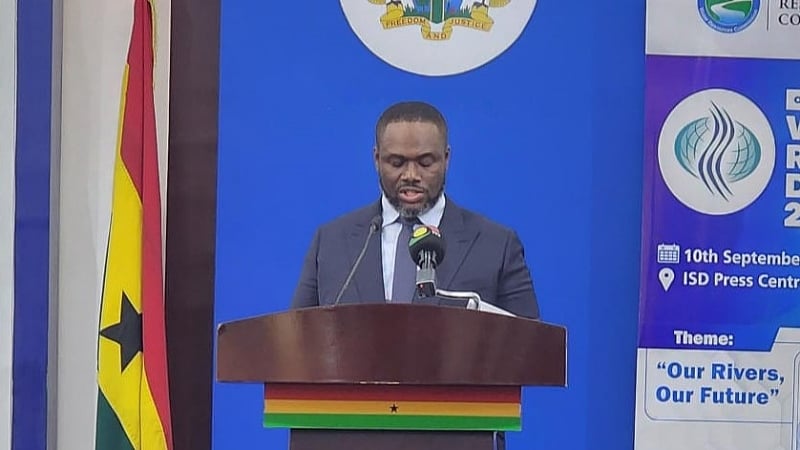Ghana’s water resources are facing a critical juncture, with declining per capita water availability threatening the nation’s future water security. Minister for Works, Housing and Water Resources, Hon. Kenneth Gilbert Adjei, has issued a stark warning that unless immediate and decisive action is taken to reverse current negative trends, Ghana risks being classified as a water-stressed nation. This alarming projection highlights the urgent need for a comprehensive and integrated approach to water resource management, encompassing stricter environmental regulations, robust infrastructure investments, and a renewed national commitment to safeguarding this essential resource.
The crux of the problem lies in the dramatic decrease in Ghana’s per capita renewable water availability, which has plummeted from approximately 3,000 cubic meters per person per year in the 1960s to a mere 1,650 cubic meters today. This precipitous decline can be attributed to a confluence of factors, including escalating pollution levels, unchecked urban expansion, and the increasingly pronounced effects of climate change. Pollution from various sources, including industrial discharge and agricultural runoff, contaminates water bodies, diminishing the usable supply. Simultaneously, rapid urbanization increases demand while also contributing to pollution and encroachment on vital water sources. Climate change exacerbates these pressures through altered rainfall patterns, increased evaporation rates, and more frequent extreme weather events, further jeopardizing water availability.
The implications of inaction are dire. Should Ghana transition to a water-stressed state, competition for limited water resources will intensify across all sectors, from households and industries to agriculture. This scarcity could trigger significant economic disruptions, impacting industrial output, agricultural productivity, and overall economic growth. Food security would be severely compromised, as agriculture heavily relies on sufficient water resources for irrigation and livestock. Moreover, the potential for social unrest and conflict over access to this essential resource cannot be ignored. Water scarcity can exacerbate existing social inequalities and create tensions within communities, potentially leading to disputes and even violence.
Several factors contribute significantly to the deterioration of Ghana’s water resources. Illegal mining activities, often employing environmentally damaging practices, release harmful chemicals and heavy metals into rivers and streams, contaminating both surface and groundwater sources. Industrial pollution, including untreated wastewater discharge from factories, further degrades water quality, posing significant risks to human health and ecosystems. Encroachment on river buffer zones, critical areas that protect water bodies from pollution and maintain their ecological integrity, reduces their natural capacity to filter pollutants and regulate water flow. This combination of human activities puts immense pressure on the already strained water resources, accelerating their decline and increasing the risk of water scarcity.
In response to this growing crisis, the government has underscored its commitment to reversing the negative trends and ensuring long-term water security. This commitment translates into a multifaceted strategy encompassing stricter enforcement of existing environmental regulations, the development and implementation of new legislative instruments to address emerging challenges, and significant investments in water infrastructure projects. Strengthening enforcement mechanisms will deter illegal mining and industrial pollution, holding those responsible accountable for their environmental impact. New legislation can address specific issues, such as regulating water extraction for various uses, protecting water catchment areas, and promoting water conservation practices. Investments in water infrastructure, including treatment plants, dams, and distribution networks, will enhance the capacity to store, treat, and distribute water efficiently, ensuring access to safe and reliable water supplies for all sectors.
The issue of water security transcends environmental concerns; it is intrinsically linked to public health, economic stability, and national security. Access to clean and safe water is fundamental to public health, preventing the spread of waterborne diseases and promoting sanitation. Water is also a critical input for various industries, and its availability is essential for economic growth and development. Furthermore, water scarcity can pose a national security threat, particularly in regions prone to conflict over resources. Therefore, ensuring water security is a multifaceted challenge requiring a comprehensive and coordinated approach involving government agencies, private sector actors, civil society organizations, and the public. Collective action and a shared commitment to protecting Ghana’s water resources are crucial to securing a water-secure future for the nation.
Ghana’s National Water Policy and its commitments under the Sustainable Development Goal 6 (Clean Water and Sanitation) provide a framework for achieving long-term water security. These policy instruments outline the principles and strategies for sustainable water resource management, emphasizing the importance of integrated water resource management, participatory approaches, and equitable access to water and sanitation services. However, policy frameworks alone are insufficient. Bold and immediate action is required to translate these policy objectives into tangible outcomes. This necessitates strong political will, effective implementation mechanisms, and sustained investment in water infrastructure and management capacity. The cost of inaction is far greater than the investment required to address the current challenges. Failure to act decisively will have cascading consequences, undermining economic development, jeopardizing public health, and threatening social stability. Therefore, a sense of urgency and a commitment to collaborative action are essential to avert the looming water crisis and secure a water-secure future for Ghana.


